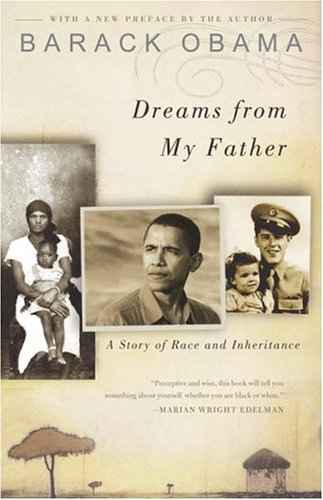Author: Barack Obama
Publisher: Times Books
Publication Date: July 18, 1995
Source: Received as a gift
Summary from Goodreads:
Dreams from My Father tells the story of Obama’s struggle to understand the forces that shaped him as the son of a black African father and white American mother—a struggle that takes him from the American heartland to the ancestral home of his great-aunt in the tiny African village of Alego.
Obama opens his story in New York, where he hears that his father—a figure he knows more as a myth than as a man—has died in a car accident. The news triggers a chain of memories as Barack retraces his family’s unusual history: the migration of his mother’s family from small-town Kansas to the Hawaiian islands; the love that develops between his mother and a promising young Kenyan student, a love nurtured by youthful innocence and the integrationist spirit of the early sixties; his father’s departure from Hawaii when Barack was two, as the realities of race and power reassert themselves; and Barack’s own awakening to the fears and doubts that exist not just between the larger black and white worlds but within himself.
Propelled by a desire to understand both the forces that shaped him and his father’s legacy, Barack moves to Chicago to work as a community organizer. There, against the backdrop of tumultuous political and racial conflict, he works to turn back the mounting despair of the inner city. His story becomes one with those of the people he works with as he learns about the value of community, the necessity of healing old wounds, and the possibility of faith in the midst of adversity.
Barack’s journey comes full circle in Kenya, where he finally meets the African side of his family and confronts the bitter truth of his father’s life. Traveling through a country racked by brutal poverty and tribal conflict, but whose people are sustained by a spirit of endurance and hope, Barack discovers that he is inescapably bound to brothers and sisters living an ocean away—and that by embracing their common struggles he can finally reconcile his divided inheritance.
A searching meditation on the meaning of identity in America, Dreams from My Father might be the most revealing portrait we have of a major American leader—a man who is playing, and will play, an increasingly prominent role in healing a fractious and fragmented nation.
My Review:
Happy Election Day, America! I felt it was only appropriate to hit you with a politically-based book today. And no, I'm not going to tell you who to vote for--that is not the point of this review! It's a review, plain and simple. Pinky swear.
I actually picked this book up on a sort-of dare. Someone (who will remain nameless) forwarded our family an email that listed all sorts of horrible things that Barack Obama has done or said regarding race, religion, etc. The email stated that all of these things were true--and if we wanted the proof, just read Dreams From My Father, because Obama wrote it all himself!
And I thought, "Wait...did you just dare me, a loyal maiden of literature, to read a book and fact-check you? CHALLENGE ACCEPTED!" So here we are.
The first thing I learned in this book: Barack Obama had no idea, in 1995, that he would be POTUS in 13 years.
Because if he did, he would never have written this memoir. And that's part of why I enjoyed it.
I can see why the right wing likes to tear this book apart. I mean, does any sitting American president want to write a book that airs his family's secrets (good and bad)? That frankly (in a refreshingly non-roundabout way) discusses their personal views and struggles with race and racism? That kind of admits that they did blow a few times? Nope, they don't want to do that. But Barack Obama wrote exactly that book before he went down the politics path, and now here it sits, for the world to judge.
I'm quite disappointed that I didn't read this earlier in Obama's presidency. I've heard about a lot of the details in news stories (and, ahem, email forwards), especially the ones that caused a media sensation (the Jeremiah Wright controversy, his Kenyan heritage, various quotes on racial politics, etc). But reading the actual memoir was much different than perusing the latest headlines--it gives you the story from the horse's mouth, so to speak.
Obama's voice is remarkably young and honest in his memoir. None of this typical political vagueness that we hear from every government figure these days. But despite his relative youth upon publication, this memoir gives you the opportunity to see how his political, personal, and spiritual preferences awakened throughout his early life. For example, he admits that in his high school and college years, he often rebelled against white culture, while trying to come to terms with his black identity. But as he gained a wider range of experiences (as a community organizer in the Chicago projects, and during a long trip to Kenya to reconnect with his family), he started to build a more inclusive vision for how communities need to work together to create change:
"What is our community, and how might that community be reconciled with our freedom? How far do our obligations reach? How do we transform mere power into justice, mere sentiment into love?...in the conversation itself, in the joining of voices, I find myself modestly encouraged, believing that so long as the questions are still being asked, what binds us together might somehow, ultimately, prevail." (p 438)
He also freely admits that he was not religious in the early part of his life--he had both Muslim and Christian education, but did not join a church and explore his spirituality until his mid-twenties.
Neither of these admissions (about race or religion) are good for him, politically. But they're honest--and how often do you hear honesty on the campaign trail? This is just one of the many ways you can see that, at the time this was written, he did not expect to end up where he is today--and this lack of awareness makes the whole book feel more down-to-earth than your average political memoir.. (He even has a section, during his trip to Africa, where he waxes about how nice it was to be in a place where people recognized and knew how to spell his name. LOL, if you only knew, dude.) I've read his second book--The Audacity of Hope--which was published after he entered politics, and that one is MUCH more voter-image friendly (read: uplifting and unlikely to ruffle feathers).
Beyond the general tone of the book, I also enjoyed hearing the story of how Obama's life was shaped by his complicated and far-flung family. He spends many years trying to chase the dreams that he believes will connect him with his father--a man that he only met once as a boy, and who died before Obama had the chance to truly know him. So much of his life has been shaped by this relationship (or lack thereof). Despite the book's often-dense musings and descriptions, this family story kept me interested and wondering what discovery would come next. In the end, you get a detailed oral history from his grandmother, which explains his father's and grandfather's lives through the eyes of Kenya's rocky past. (As a boring ol' WASP with comparatively uneventful roots in Italy/Ireland/Germany, this was both fascinating and heartbreaking to read.)
Overall, I think any reader (from the right, left, or center) who enjoys political memoirs should give this book a try. Obviously, you're going to read different messages into it, depending on your political leanings. But it paints a portrait of a president that you don't often get to see--one of idealism and hope, before the political jockeying of Washington muddies the water. For that reason alone, it's worth the read.
(Oh, and that email forward? Nearly every line was either taken out of context or misquoted. CHALLENGE COMPLETE! Somebody call Snopes.)









